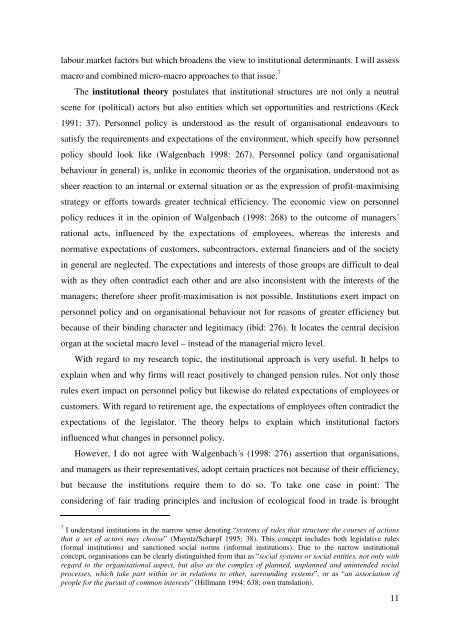Dissertation_Paula Aleksandrowicz_12 ... - Jacobs University
Dissertation_Paula Aleksandrowicz_12 ... - Jacobs University
Dissertation_Paula Aleksandrowicz_12 ... - Jacobs University
Create successful ePaper yourself
Turn your PDF publications into a flip-book with our unique Google optimized e-Paper software.
labour market factors but which broadens the view to institutional determinants. I will assess<br />
macro and combined micro-macro approaches to that issue. 7<br />
The institutional theory postulates that institutional structures are not only a neutral<br />
scene for (political) actors but also entities which set opportunities and restrictions (Keck<br />
1991: 37). Personnel policy is understood as the result of organisational endeavours to<br />
satisfy the requirements and expectations of the environment, which specify how personnel<br />
policy should look like (Walgenbach 1998: 267). Personnel policy (and organisational<br />
behaviour in general) is, unlike in economic theories of the organisation, understood not as<br />
sheer reaction to an internal or external situation or as the expression of profit-maximising<br />
strategy or efforts towards greater technical efficiency. The economic view on personnel<br />
policy reduces it in the opinion of Walgenbach (1998: 268) to the outcome of managers´<br />
rational acts, influenced by the expectations of employees, whereas the interests and<br />
normative expectations of customers, subcontractors, external financiers and of the society<br />
in general are neglected. The expectations and interests of those groups are difficult to deal<br />
with as they often contradict each other and are also inconsistent with the interests of the<br />
managers; therefore sheer profit-maximisation is not possible. Institutions exert impact on<br />
personnel policy and on organisational behaviour not for reasons of greater efficiency but<br />
because of their binding character and legitimacy (ibid: 276). It locates the central decision<br />
organ at the societal macro level – instead of the managerial micro level.<br />
With regard to my research topic, the institutional approach is very useful. It helps to<br />
explain when and why firms will react positively to changed pension rules. Not only those<br />
rules exert impact on personnel policy but likewise do related expectations of employees or<br />
customers. With regard to retirement age, the expectations of employees often contradict the<br />
expectations of the legislator. The theory helps to explain which institutional factors<br />
influenced what changes in personnel policy.<br />
However, I do not agree with Walgenbach´s (1998: 276) assertion that organisations,<br />
and managers as their representatives, adopt certain practices not because of their efficiency,<br />
but because the institutions require them to do so. To take one case in point: The<br />
considering of fair trading principles and inclusion of ecological food in trade is brought<br />
7 I understand institutions in the narrow sense denoting “systems of rules that structure the courses of actions<br />
that a set of actors may choose” (Mayntz/Scharpf 1995: 38). This concept includes both legislative rules<br />
(formal institutions) and sanctioned social norms (informal institutions). Due to the narrow institutional<br />
concept, organisations can be clearly distinguished from that as “social systems or social entities, not only with<br />
regard to the organisational aspect, but also as the complex of planned, unplanned and unintended social<br />
processes, which take part within or in relations to other, surrounding systems”, or as “an association of<br />
people for the pursuit of common interests” (Hillmann 1994: 638; own translation).<br />
11
















